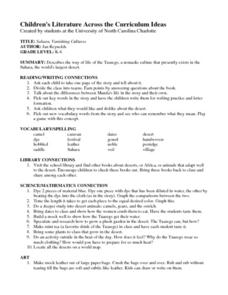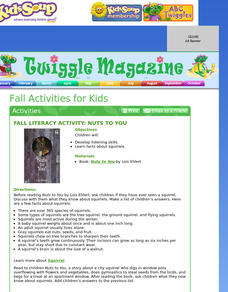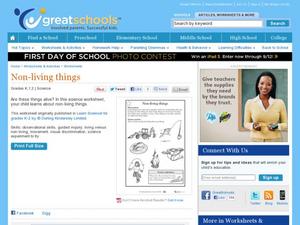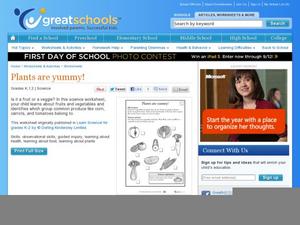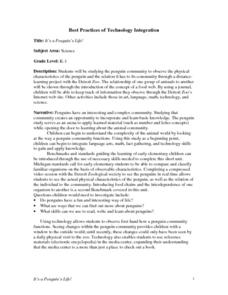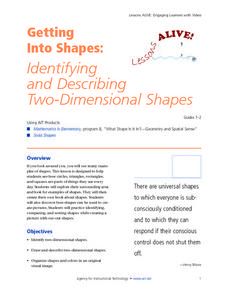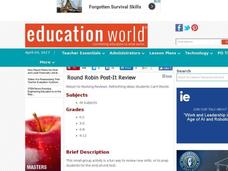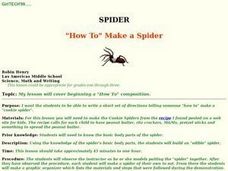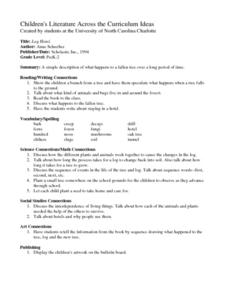Curated OER
Valentine Candy Count
Students analyze a bag of Valentine candy to create a graph. In this graphing lesson, students make predictions, sort by color, record data and make a graph. Students discuss results and make generalizations. Students generate their own...
Curated OER
Storms and Extreme Weather
Students explore hurricanes and tornadoes by conducting an experiment. In this weather pattern lesson, students define many extreme weather vocabulary terms and discuss the relationship with static electricity. Students utilize plastic...
Curated OER
Children's Literature Across the Curriculum Ideas-Sahara, Vanishing Cultures
Pupils read Sahara, Vanishing Cultures by Jan Reynolds. They complete a variety of cross-curricular activities surrounding the study nomadic cultures. Included are reading, art, math, science, writing, social studies, and library...
Curated OER
Making Models of the Solar System
Students make several models of the solar system to learn the positions of the planets in the solar system as well as relative distances and sizes. Creation of these models will help them identify the planets by size, shape, color,...
Curated OER
Nuts About Squirrels
Early childhood students will develop listening skills as they read "Nuts To You" by Lois Ehlert. In this lesson students will learn about Students will learn facts about different types of squirrels and their behaviors. There will be a...
Curated OER
Non-living Things
Very young scientists circle the things on the worksheet that they think are living things. Most of the pictures are of non-living things. A handy worksheet to use during any initial discussion about living vs. non-living things.
Curated OER
Plants are yummy!
Is it a fruit or a vegetable? Youngsters place an F next to each fruit they see and a V next to the vegetables. Corn is tricky. It is a grass, so it's actually not a fruit or a vegetable, but a grain!
Curated OER
It's a Penguin's Life!
Students will be studying the penguin community to observe the physical characteristics of the penguin and the relation it has to its community through a distance learning project with the Detroit Zoo.
Curated OER
Getting Into Shapes: Identifying and Describing Two-Dimensional Shapes
Young scholars examine their classroom to find examples of various types of shapes. After identifying and describing the various shapes, they draw as many as they can on a piece of paper. They organize them into an image based on their...
Curated OER
Measure Up!
Discover ways to measure items without standard tools. In this measurements lesson, learners estimate how long certain objects are by measuring with a non-standard measuring tool. Students check their estimates with a ruler and share...
Curated OER
A Home for a Cricket
First graders build a habitat for crickets after studying animal survival needs. They care for and observe the crickets in the classroom habitat.
Curated OER
Money in Action
Students become familiar with the various coins in our money system as well as amount of each coin. They help develop their ability to count change and find different ways to show equal amounts.
Curated OER
Round Robin Post-It Review
Learners of all ages participate in a unique review activity. They work in a small group setting on individual review questions designed by the teacher. Each individual answers a key review question on a notecard or sticky note and...
Alabama Learning Exchange
Mix it Up! Exploring the Commutative and Associative Properties of Addition
Examine commutative and associative properties with your class. They'll explore the relationships between addition and subtraction and investigate patterns as they solve addition problems. Links to an assessment and a table game are...
Curated OER
Pebbles, Sand and Silt -- Categorizing Fiction and Informational Books
Primary readers complete the activities in a Pebbles, Sand and Silt FOSS kit. As a class, they are given a group of rocks and they are to categorize them based on their activities in the FOSS kit. They use this information and apply it...
Curated OER
Measurements: Inches
Children solve problems involving measurement using information taken from various items measured (wooden blocks and boxes). This is a particularly good lesson to use when introducing how to use a ruler and how to add inches together in...
Curated OER
A Honey of a Hexagon
Students explore how bees make honey and why the hexagon is the best basic pattern for the honeycomb through the use of a video and hands-on activities with honeycombs and geometric shapes.
Curated OER
Alliance to Save Energy's Green Schools Program
First graders, in groups, discover which colors absorb heat and which colors best reflect heat. They do this using the scientific method.
Curated OER
Spider "How To" Make a Spider
Young chefs follow the set-by-step instructions of a recipe and use their prior knowledge of the body parts of a spider to make edible spider cookies. After completing a pre-writing graphic organizer they then write a "how to"...
Curated OER
How Much Water Do Plants Need?
Students experiment with the effects of varying amounts of water on household plants. They give different amounts of water to plants and then observe and record the effects.
Curated OER
Shape Hunt
Explore the world of shapes! After free tangram exploration and pair share time, learners describe various patterns and shapes in both the natural and designed world. They investigate the use of tangrams to create patterns and shapes.
Curated OER
Log Hotel
Students identify how the different plants and animals work together to cause the changes in the log. Students discuss the sequence of events in the life of the tree and log. Students plant a seed to take home and care for. Students...
Alabama Learning Exchange
Heads, Shoulders, Knees, and Toes
The identification of various parts of the human body is the focus of this biology lesson. Young scientists sing the song "Head, Shoulders, Knees, and Toes," and trace the human body onto butcher paper. Additionally, they label the parts...
Curated OER
Connecting With Coordinates
Play a coordinates game to encourage collaborative learning and grid use! Learners plot points on grids and play a game that challenges them to locate a specific point on a coordinate grid by using horizontal and vertical movements.
Other popular searches
- Math and Science Careers
- Integrated Math and Science
- Science and Math
- Science/ Math Games
- Math and Science Activities
- Integrating Math and Science
- +Math and Science Careers
- Math and Science Plan
- Math and Science Lessons
- Word Origins Science Math
- Math in Science Experiments
- Science Math


